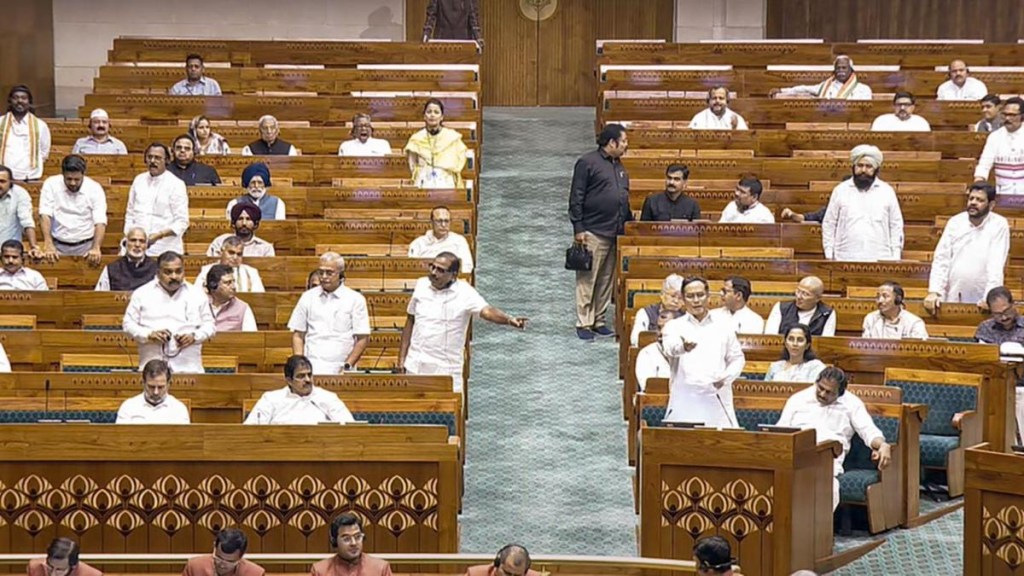The central government on Tuesday introduced the Immigration and Foreigners Bill, 2025, in the Lok Sabha, seeking to streamline various services related to immigration, including the entry, stay and exit of foreigners in India. However, the bill faced immediate resistance from the opposition, which called it unconstitutional and potentially restrictive.
MoS Home Nityanand Rai defended the bill and said that Parliament had full legislative authority under the Union list to bring such legislation. Emphasising the need for national security, he stated that while India welcomes tourists, ensuring the nation’s peace and sovereignty remains a top priority.
Congress MP Manish Tewari opposed the bill at the introduction stage, arguing that it violates multiple constitutional provisions and fundamental rights.
Congress MP Manish Tewari from Chandigarh opposed the bill, claiming that it violates the “multiple fundamental rights” under the Constitution of India. He said, “Rule 72(1) of the rules of procedure and conduct of business of the Lok Sabha contemplates two situations. One is opposition to a bill simplicities and second on opposition to a bill on the grounds of legislative incompetence. This is a violation of fundamental rights on multiple counts…It violates multiple fundamental rights under the Constitution of India.”
He expressed concerns that the government could use the bill’s provisions to restrict the entry of individuals whose views do not align with the ruling party’s ideology.
TMC MP Saugata Roy warned that the proposed law could deter the inflow of talent from other countries, potentially impacting various sectors reliant on foreign expertise. “I beg to oppose the Immigration and Foreigners Bill. There are already 4 bills in the country for the entry and exit of foreigners,” he said.
Rai, however, clarified that the bill aims to resolve overlapping and redundant provisions within existing immigration laws. The proposed legislation seeks to replace the outdated Registration of Foreigners Act, 1939 and the Foreigners Act, 1946, with a comprehensive framework to govern immigration in a more structured manner.
Currently, Indian visas are issued both physically by missions abroad and electronically under seven categories by the Bureau of Immigration (BoI) to nationals from 167 countries. Additionally, visa-on-arrival facilities are available at six designated airports for citizens of Japan, South Korea and select UAE nationals who have previously held an Indian visa.
The regulation of foreign nationals’ stay and movement in India remains the responsibility of the BoI, in coordination with state governments and Union Territory administrations. According to existing laws, all foreigners on long-term (more than 180 days) student, medical, research, employment, missionary and project visas are required to register with the Foreigners Regional Registration Officer (FRRO) or the Foreigners Registration Officer (FRO) concerned, having jurisdiction over the place where the foreigner intends to stay, within 14 days of arrival.
Pakistani nationals are required to register within 24 hours of their arrival.
Other laws that cover foreigners in India include the Citizenship Act, 1955, which regulates acquisition and termination of Indian citizenship as well as acquisition and registration of foreigners as Overseas Citizens of India (OCI).
The Passports Act, 1967, provides for the issue of passports and travel documents to regulate departure from India of citizens of India and other persons, and the Immigration (Carriers’ Liability) Act, 2000, that makes carriers liable in respect of passengers brought by them into India in contravention of provisions of the Passport Act.
Apart from movement, stay and visa, there are certain protected areas in India where foreigners need special permits to travel, including multiple states in the northeastern region, the whole of Andaman and Nicobar, and parts of Jammu and Kashmir, Uttarakhand, Himachal Pradesh and Rajasthan.
According to Union Home Ministry data, a total of 98,40,321 (98.40 lakh) foreigners visited India between April 1, 2023, and March 31, 2024.
